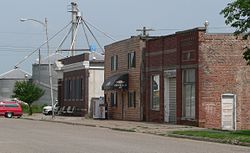Kennard, Nebraska
| Kennard, Nebraska | |
|---|---|
| Village | |

Downtown Kennard: Maple Street
|
|
 Location of Kennard, Nebraska |
|
| Coordinates: 41°28′27″N 96°12′13″W / 41.47417°N 96.20361°WCoordinates: 41°28′27″N 96°12′13″W / 41.47417°N 96.20361°W | |
| Country | United States |
| State | Nebraska |
| County | Washington |
| Area | |
| • Total | 0.30 sq mi (0.78 km2) |
| • Land | 0.30 sq mi (0.78 km2) |
| • Water | 0 sq mi (0 km2) |
| Elevation | 1,148 ft (350 m) |
| Population (2010) | |
| • Total | 361 |
| • Estimate (2016) | 363 |
| • Density | 1,200/sq mi (460/km2) |
| Time zone | Central (CST) (UTC-6) |
| • Summer (DST) | CDT (UTC-5) |
| ZIP code | 68034 |
| Area code(s) | 402 |
| FIPS code | 31-25230 |
| GNIS feature ID | 0830471 |
Kennard is a village in Washington County, Nebraska, United States. The population was 361 at the 2010 census.
Kennard was established in 1869 when the Sioux City & Pacific Railroad was extended to that point. It was named for Thomas P. Kennard, the first Secretary of State for Nebraska. The town was incorporated in 1895.
Kennard is located at 41°28′27″N 96°12′13″W / 41.47417°N 96.20361°W (41.474254, -96.203706).
According to the United States Census Bureau, the village has a total area of 0.30 square miles (0.78 km2), all of it land.
As of the census of 2010, there were 361 people, 150 households, and 95 families residing in the village. The population density was 1,203.3 inhabitants per square mile (464.6/km2). There were 158 housing units at an average density of 526.7 per square mile (203.4/km2). The racial makeup of the village was 97.8% White, 0.3% Native American, 0.3% Asian, 1.4% from other races, and 0.3% from two or more races. Hispanic or Latino of any race were 1.7% of the population.
...
Wikipedia
